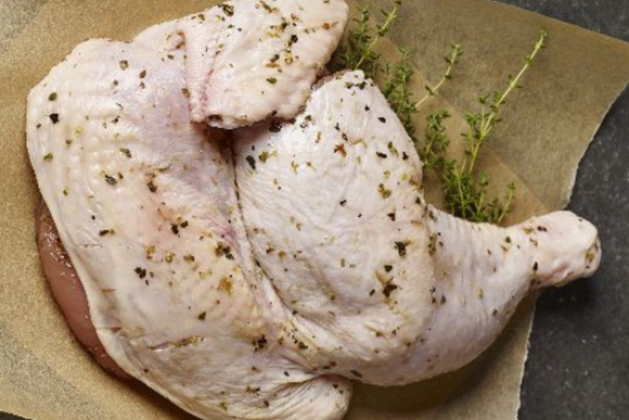Brining has long been a favorite technique among cooks to ensure moist and flavorful chicken.
When it comes to cooking chicken, brining is a popular method for enhancing its flavor and juiciness. But what comes next often stirs up a bit of confusion: should you season the chicken after brining?
Whether you’re a seasoned chef or a home cook looking to improve your poultry dishes, understanding the impact of seasoning after brining is key to achieving delicious results.
We have an answer to your question as well as provide you further excellent information that may help you to make ready a delicious recipe.
Do You Season Chicken After Brining?
Yes, You can absolutely season your chicken after brining. When brining meat, the primary goal is to enhance its moisture and tenderness.
The brine, typically a mixture of water, salt, and you can also add which sometimes sugar or spices, infuses the chicken with flavor and moisture.
After brining, you can certainly season the chicken further to add more complex flavors. However, it’s important to remember that the chicken has already absorbed salt from the brine at the start of the recipe.
Therefore, if you choose to add more seasoning, it’s advisable to use seasonings that are low in salt or salt-free to avoid an overly salty taste.
Herbs, spices, and other salt-free flavorings can be used to create a desired flavor profile without increasing the salt content significantly.
What is its Science Behind Brining
Brining is more than just soaking chicken in a saltwater solution. It’s a scientific process that enhances the meat’s ability to retain moisture. By osmosis, the salt solution penetrates the chicken, breaking down protein structures and allowing water and flavors to be absorbed. The result is a juicier, more tender chicken.
The Role of Seasoning in Cooking
When we cook, adding different flavors to our food is essential. This is where seasoning plays a big role. Seasoning is like adding a little magic to our dishes to make them taste better. It’s not just about making food salty or spicy; it’s about bringing out the best flavors in what we’re cooking.
One common way to add flavor is through brining. This is especially popular when preparing meats like chicken breasts or turkey. Brining means soaking the meat in a mixture of water and salt, and sometimes other tasty ingredients like herbs. This helps to make the meat juicy and full of flavor.

There are two main types of brining: wet brine & dry brine. Wet brine is when you soak the meat in a liquid mixture. Dry brine is a bit different. Instead of using water, you rub salt and other seasonings directly onto the meat. This still adds lots of flavors and can help make the skin crispy when you cook it.
For example, if you’re preparing a turkey, you might use a dry brine. You rub salt and maybe some herbs onto the turkey before you cook it. This not only flavors the turkey but also helps get that nice, crispy skin everyone loves.
Another important thing to remember is that if you brine meat, you often don’t need to rinse it before cooking. Rinsing can actually wash away some of the flavors you’ve added. So, after brining, you can usually go straight to cooking.
Tips for Seasoning Post-Brine: Spice It Right
If you’re on Team Season-After-Brining (and I am!), here are some tips to get it just right:
- Pat It Dry: Before you season, pat the chicken dry. This helps the seasonings stick better and gives you that crave-worthy crust when cooked.
- Easy on the Salt: The chicken has soaked up salt from the brine, so go easy with additional salt. Focus on herbs and spices for added flavor.
- Flavor Play: Experiment with different seasonings. Think about the dish’s overall flavor profile and choose seasonings that complement it.
- Mind the Sugar: If you’re grilling or using high heat, avoid sugar in your seasonings; it can burn and turn bitter.
To Season or Not to Season After Brining
After you brine chicken or turkey, you might wonder if you should add more flavors. Brining, where you soak the meat in a saltwater solution, already makes it tasty and juicy. But what about adding more seasoning after this? Let’s talk about that.
First, remember what brining does. It’s like giving your meat a flavor bath. The salt in the water gets into the meat, making it moist and a bit salty. Sometimes, you add other things like sugar, herbs, or spices to the brine for more taste.

Now, should you add more seasoning after brining? It depends on what you like. If you enjoy more flavors, go ahead and sprinkle some extra seasoning on your meat. This could be anything from simple black pepper to a mix of spices.
But, be careful with salt. Since brining already makes the meat a bit salty, adding too much salt afterwards can make it too salty. Instead, try other seasonings that don’t have salt. Herbs like rosemary or thyme, or spices like paprika, can add great flavor without making it too salty.
Also, think about how you’re cooking the meat. If you’re roasting or grilling, some extra seasoning can add a nice crust or char. But if you’re making a soup or stew, you might not need extra seasoning, as the meat will flavor the dish.
In short, after brining, you can add more seasoning if you like, but be mindful of how much salt you use. Experiment with different herbs and spices to find what tastes best to you.
Alternatives to Seasoning Post-Brining
After you brine meat, like a chicken or turkey, you might think about adding more flavors. But what if you want to try something different instead of seasoning after brining? Here are some ideas:

- Season Before Brining: Instead of adding flavors after brining, you can do it before. Rub your meat with spices, herbs, or even a mix of salt and sugar. This way, the flavors get into the meat during the brining process.
- Flavorful Brine: Make your brine more than just salt and water. Add garlic, herbs, citrus peels, or spices to the brine. This infuses the meat with these flavors, so you might not need to add more seasoning later.
- Marinades: After brining, you can marinate your meat. A marinade is like a tasty bath for your meat, made with things like oil, vinegar, herbs, and spices. It adds different flavors and can make the meat tender.
- Glazes and Sauces: Instead of dry seasoning, try a glaze or sauce. After cooking your brined meat, brush it with something sweet and sticky, like a honey glaze, or serve it with a flavorful sauce. This adds a burst of flavor with every bite.
- Stuffing: For meats like turkey or chicken, you can add flavor from the inside by stuffing them. Fill the cavity with things like onions, herbs, lemon, or even flavored rice or bread stuffing. This gives a subtle flavor that’s different from seasoning on the outside.
- Each of these alternatives offers a unique way to add flavor to your meat. Whether you choose to season before brining, use a flavorful brine, marinate, apply a glaze, or stuff your meat, you can create delicious dishes that are full of taste! and if you use it with pickles which also enhance taste of this food.



You have observed very interesting points!
ps nice site.Blog money
[…] spatchcocked, it’s ready for brining. The brine, typically a mixture of water, salt, and various seasonings, can be customized to your taste. Common additions include sugar, herbs, garlic, and citrus. […]
[…] spatchcocked, it’s ready for brining. The brine, typically a mixture of water, salt, and various seasonings, can be customized to your taste. Common additions include sugar, herbs, garlic, and citrus. […]